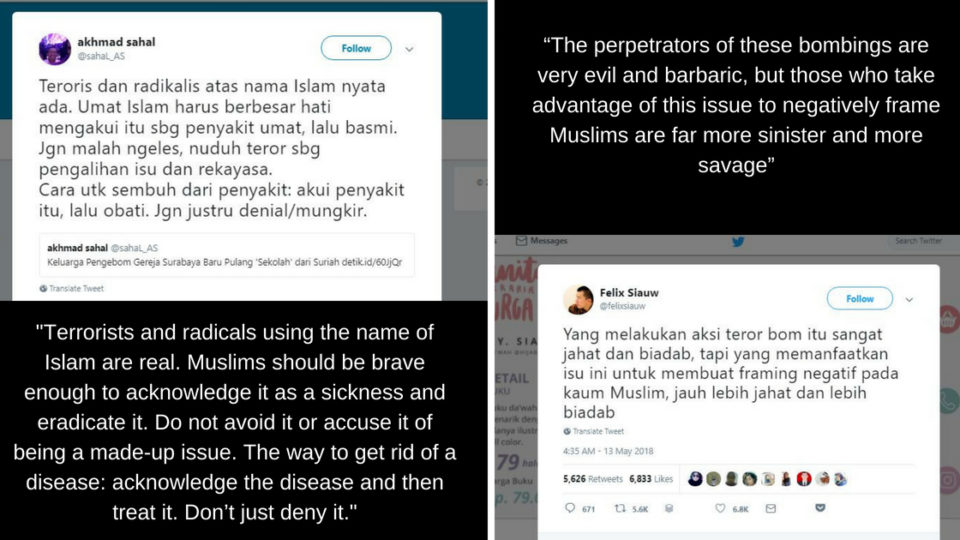Yesterday’s horrific attacks on 3 churches in Surabaya, East Java, were met with the same kind of defiant response that we have seen in the wake of previous terrorist attacks, such as #KamiTidakTakut (#WeAreNotAfraid) and #BersatuLawanTeroris (#UnitedAgainstTerrorists).
But with the shocking revelation by police that the suicide bomb attacks were perpetrated by a father and mother, accompanied by their four children (including 12 and 9-year-old girls), who were part of a radical group linked to the Islamic State, a large segment of the response turned into a debate on the role of religion in terrorism. The word agama (religion) even became a trending topic on Twitter, sans hashtag.
By and large, the primary response from the Muslim-majority nation has been to say that no religion, especially Islam, supports terrorism. President Joko Widodo’s response is emblematic of this:
Tindakan terorisme sungguh biadab. Korbannya anggota masyarakat, anggota kepolisian, bahkan anak-anak. Kita akan hancurkan basis pelaku dan para pendukungnya. Terorisme adalah musuh bagi semua agama -Jkw pic.twitter.com/iFLOW93KZ3
— Joko Widodo (@jokowi) May 13, 2018
Acts of terrorism are barbaric. The victims are members of the community, police officers, and even children. We will destroy the base of the perpetrators and their supporters. Terrorism is the enemy of all religions -Jkw
But, as a corollary to this, there were many who argued that the terrorists have no religion and that they were not really Muslims because they did not follow the faith’s teachings. The hashtags #TerorismeBukanIslam (#TerrorismIsNotIslam) and #IslamLawanTerorisme (#IslamAgainstTerrorism) have both been trending in Indonesia at various points recently.
This is Islam's Way. The way that our beloved prophet Muhammad SAW teaching us. Other than this, then it's NOT Islam#TerorismeBukanIslam pic.twitter.com/r1Y7FZcSI9
— Ryn (@RantieFdn) May 14, 2018
Numerous accounts (many of which appear to be bots) were using the hashtags to tweet out a multi-point response, supposedly from banned Islamist group Hizbut Tahir Indonesia in which they renounce the attacks, argue that they are against the teachings of Islam and also that they should not be used as a justification by the government to pass a much-discussed terrorism bill.
https://twitter.com/ferdi_aceh/status/995847972129726464
https://twitter.com/ferdi_aceh/status/995848323327127552
https://twitter.com/ferdi_aceh/status/995848455015743488
https://twitter.com/ferdi_aceh/status/995848900404699136
https://twitter.com/ferdi_aceh/status/995848998056493057
https://twitter.com/ferdi_aceh/status/995849094940704769
On the other side, while nobody is arguing that Islam would support these terrorist’s actions, there were several viral tweets arguing that denying the connection between terrorism and religion, or saying that the perpetrators did not believe they were followers of Islam, is intellectually dishonest and makes it more difficult to combat the problem.
This tweet features a video of Yaqut Cholil Qoumas, chairman of the Ansor Youth Movement (GP Ansor), the youth wing of Nahdlatul Ulama, Indonesia and the world’s biggest Islamic organization speaking on the subject.
https://twitter.com/qitmr/status/995519759746715649
The caption summarizes his speech by writing, “It’s not the case that terrorists do not have religion, we just do not dare to honestly admit it. If we are not honest, then this terrorism problem will never be solved.”
Yaqut tweeted another similar sentiment following last week’s prison riot at the Makos Brimob detention center in Depok.
Jika kalian masih saja diam, atau bahkan menyangkal bahwa tdk ada kelompok radikal yg mengatasnamakan agama di negeri ini, bumi yg kalian pijak akan menjadi mako brimob berikutnya..
— yaqut cholil qoumas (@Ansor_Satu) May 9, 2018
“If we remain silent, or even deny that there are radical groups using the name of religion in this country, the earth will become the next Mako Brimob..”
Akhmad Sahal, an NU scholar currently teaching at the University of Pennsylvania, wrote this:
Teroris dan radikalis atas nama Islam nyata ada. Umat Islam harus berbesar hati mengakui itu sbg penyakit umat, lalu basmi. Jgn malah ngeles, nuduh teror sbg pengalihan isu dan rekayasa.
Cara utk sembuh dari penyakit: akui penyakit itu, lalu obati. Jgn justru denial/mungkir. https://t.co/X5lT8MQU5Q— akhmad sahal (@sahaL_AS) May 13, 2018
Terrorists and radicals using the name of Islam are real. Muslims should be brave enough to acknowledge it as a sickness and eradicate it. Do not avoid it or accuse it of being a made-up issue. The way to get rid of a disease: acknowledge the disease and then treat it. Don’t just deny it.
While influential NU members may have some leeway in saying these sorts of things, it is rare to see others say these things in Indonesia given the country’s religious sensitivities and blasphemy laws. But they were hardly alone in sharing similar sentiments following these latest attacks.
Hasan Nasbi, the head of the Cyrus Network political consulting group and self-described “provocator” wrote:
https://twitter.com/datuakrajoangek/status/995706927832182785?s=19
Terrorists are religious. They are more obedient in performing their religious rituals than us. Don’t say they are not religious. They are not communists. Also not atheists. A non-religious person will never have the hardened conviction needed to commit a suicide bombing.
Back to the other side (the far, far side) we have celebrity Islamic preacher Felix Siauw, who wrote this vile tweet:
Yang melakukan aksi teror bom itu sangat jahat dan biadab, tapi yang memanfaatkan isu ini untuk membuat framing negatif pada kaum Muslim, jauh lebih jahat dan lebih biadab
— Felix Siauw (@felixsiauw) May 13, 2018
“The perpetrators of these bombings are very evil and barbaric, but who take advantage of this issue to negatively frame Muslims are far more sinister and more savage”
With the whole country bracing for the possibility of yet more terrorist attacks following another bomb explosion in Sidoarjo and the suicide bombing at the Surabaya Police headquarters this morning, this is not a discussion that will likely be resolved anytime soon. But given the climate of rising religious conservatism in the country, it’s been a discussion that’s been basically off limits for too long and one the country clearly needs to have.




